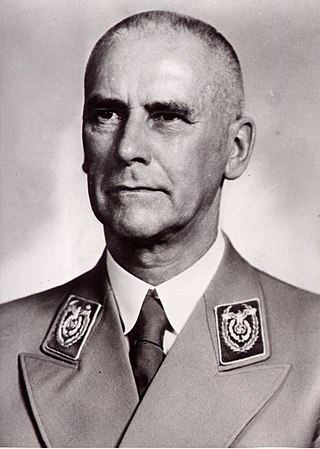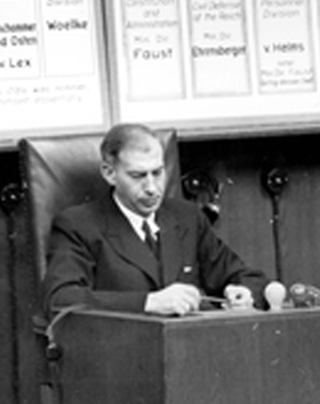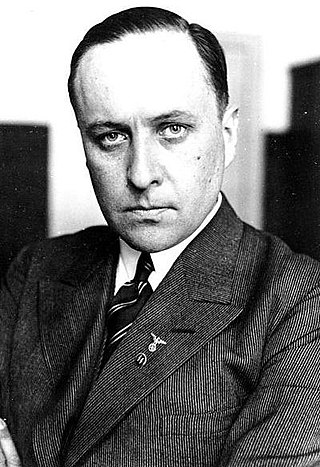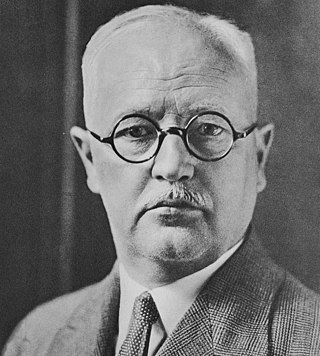
Nazi Germany, officially known as the German Reich until 1943, later the Greater German Reich, was the German state between 1933 and 1945, when Adolf Hitler and the Nazi Party controlled the country, transforming it into a totalitarian dictatorship.

The Nazi Party, officially the National Socialist German Workers' Party, was a far-right political party in Germany active between 1920 and 1945 that created and supported the ideology of Nazism. Its precursor, the German Workers' Party, existed from 1919 to 1920. The Nazi Party emerged from the extremist German nationalist, racist and populist Freikorps paramilitary culture, which fought against communist uprisings in post–World War I Germany. The party was created to draw workers away from communism and into völkisch nationalism. Initially, Nazi political strategy focused on anti–big business, anti-bourgeois, and anti-capitalist rhetoric; it was later downplayed to gain the support of business leaders. By the 1930s, the party's main focus shifted to antisemitic and anti-Marxist themes. The party had little popular support until the Great Depression, when worsening living standards and widespread unemployment drove Germans into political extremism.

Reinhard Tristan Eugen Heydrich was a high-ranking German SS and police official during the Nazi era and a principal architect of the Holocaust.

The Schutzstaffel was a major paramilitary organisation under Adolf Hitler and the Nazi Party in Nazi Germany, and later throughout German-occupied Europe during World War II.

Karl Brandt was a German physician and Schutzstaffel (SS) officer in Nazi Germany. Trained in surgery, Brandt joined the Nazi Party in 1932 and became Adolf Hitler's escort doctor in August 1934. A member of Hitler's inner circle at the Berghof, he was selected by Philipp Bouhler, the head of Hitler's Chancellery, to administer the Aktion T4 euthanasia program. Brandt was later appointed the Reich Commissioner of Sanitation and Health. Accused of involvement in human experimentation and other war crimes, Brandt was indicted in late 1946 and faced trial before a U.S. military tribunal along with 22 others in United States of America v. Karl Brandt, et al. He was convicted, sentenced to death, and hanged on 2 June 1948.
Sicherheitsdienst, full title Sicherheitsdienst des Reichsführers-SS, or SD, was the intelligence agency of the SS and the Nazi Party in Nazi Germany. Established in 1931, the SD was the first Nazi intelligence organization and the Gestapo was considered its sister organization through the integration of SS members and operational procedures. The SD was administered as an independent SS office between 1933 and 1939. That year, the SD was transferred over to the Reich Security Main Office, as one of its seven departments. Its first director, Reinhard Heydrich, intended for the SD to bring every single individual within the Third Reich's reach under "continuous supervision".

Ernst Julius Günther Röhm was a German military officer and a leading member of the Nazi Party. A close friend and early ally of Adolf Hitler, Röhm was the co-founder and leader of the Sturmabteilung (SA), the Nazi Party's original paramilitary wing, which played a significant role in Adolf Hitler's rise to power. He served as chief of the SA from 1931 until his murder in 1934 during the Night of the Long Knives.

Wilhelm Frick was a prominent German politician of the Nazi Party (NSDAP), who served as Minister of the Interior in Adolf Hitler's cabinet from 1933 to 1943 and as the last governor of the Protectorate of Bohemia and Moravia.

The Protectorate of Bohemia and Moravia was a partially-annexed territory of Nazi Germany that was established on 16 March 1939 after the German occupation of the Czech lands. The protectorate's population was mostly ethnic Czech.

Wilhelm Stuckart was a German Nazi Party lawyer, official, and a State Secretary in the Reich Interior Ministry during the Nazi era. He was a co-author of the notorious Nuremberg Laws and a participant in the January 1942 Wannsee Conference, at which the genocidal Final Solution to the Jewish Question was planned. He also served as Reichsminister of the Interior in the short-lived Flensburg government at the end of the Second World War.

Richard Walther Darré was one of the leading Nazi "blood and soil" ideologists and served as Reich Minister of Food and Agriculture. As the National leader for agricultural policy, he was a high-ranking functionary in the Nazi Party and as a Senior group leader in the SS, he was the seventh most senior commander in that organisation. He was tried and found guilty on three counts at the Ministries Trial.

Rudolf Jung was a National Socialist theoretician and the head of the German Bohemian Nazi movement from 1926 to 1933 before he emigrated to Germany. He joined the Nazi Party, was made an Honorary Gauleiter and became an SS-Gruppenführer. After the end of the Second World War, he was arrested and imprisoned by the Czechoslovak government but committed suicide before he could be brought to trial.

Kurt Max Franz Daluege was a German SS and police official who served as chief of Ordnungspolizei of Nazi Germany from 1936 to 1943, as well as the Deputy/Acting Protector of Bohemia and Moravia from 1942 to 1943.

Hans Heinrich Lammers was a German jurist and prominent Nazi Party politician. From 1933 until 1945 he served as Chief of the Reich Chancellery under Adolf Hitler. In 1937, he additionally was given the post of Reichsminister in the cabinet. During the 1948–1949 Ministries Trial, Lammers was found guilty of crimes against peace, war crimes, crimes against humanity, and membership in a criminal organization. He was sentenced to 20 years in prison in April 1949 but this was later reduced to 10 years and he was released early.

Franz Xaver Schwarz was a high ranking German Nazi Party official who served as Reichsschatzmeister of the Party throughout most of its existence. He was also one of the highest ranking members of the Schutzstaffel (SS).

Karl Rudolf Werner Best was a German jurist, police chief, SS-Obergruppenführer, Nazi Party leader, and theoretician from Darmstadt. He was the first chief of Department 1 of the Gestapo, Nazi Germany's secret police, and initiated a registry of all Jews in Germany. As a deputy of SS-Obergruppenführer Reinhard Heydrich, he organized the World War II SS-Einsatzgruppen, paramilitary death squads that carried out mass-murder in Nazi-occupied territories.

Udo Gustav Wilhelm Egon von Woyrsch was a Nazi Party politician and SS-Obergruppenführer in Nazi Germany who participated in the massacre of Jews in Poland, and was later convicted of being an accessory to manslaughter in connection with the Night of the Long Knives murders.

Werner Lorenz was an SS functionary during the Nazi era. He was head of the Volksdeutsche Mittelstelle (VOMI), an organization charged with resettling ethnic Germans in the "German Reich" from other parts of Europe, as well as colonising the occupied lands during World War II. After the war, Lorenz was sentenced to prison for crimes against humanity in 1948. He was released in 1954 and died in 1974.

Ulrich Graf was an early member of the Nazi Party and one of Adolf Hitler's inner circle. In 1923, he served in a bodyguard unit for Hitler and was wounded in the Beer Hall Putsch. He was a long serving member of the Munich City Council and the Supreme Party Court and in 1936 was elected to the Reichstag. After the war, Graf was sentenced to five years of hard labour by a denazification court and died in 1950.

Ludwig Siebert was a German lawyer and Nazi Party politician who served as the Minister President of Bavaria in Nazi Germany from 1933 to 1942.



















